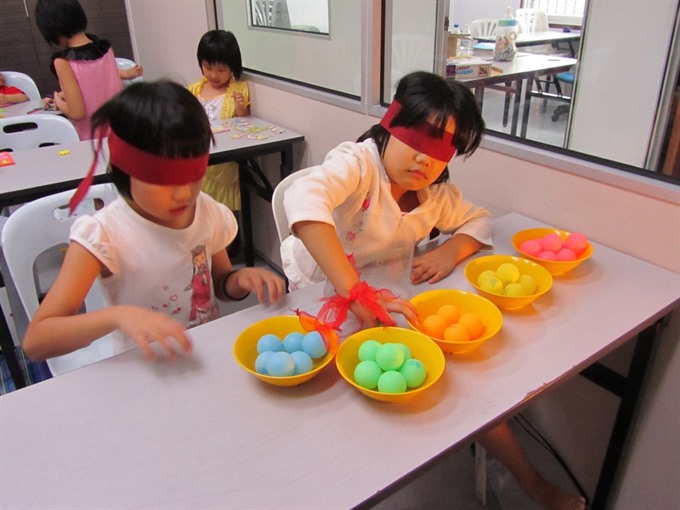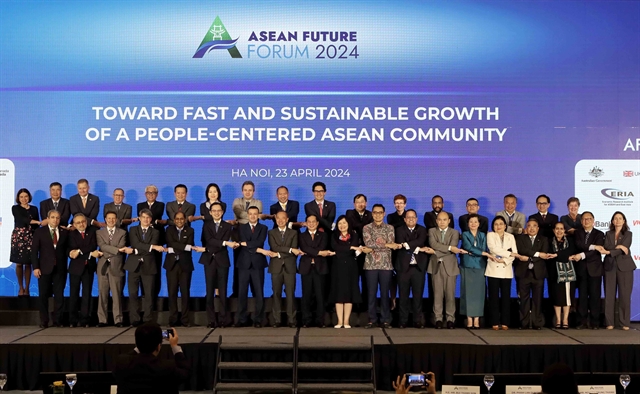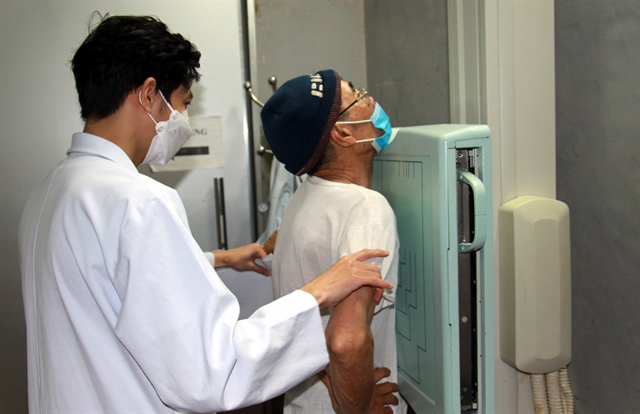 Talk Around Town
Talk Around Town

Mid-brain Activation seems to be on a lot of minds these days. But in these days of relentless marketing, we need to be a bit skeptical and not get carried away.
 |
By Thu Vân
Mid-brain Activation seems to be on a lot of minds these days.
Of course, this is thanks to a constant bombardment of advertisements on multiple media fronts.
Those offering this service claim this “activiation” will equip children with what amounts to extra-sensory abilities in just two days. By stimulating some parts of the brain, children will have improved memory, powers of concentration as well as better intuition.
In these days of intense, stressful academic competition that begins right at the kindergarten level, how can any parent resist such gains!
So, there’s Math training, English training, and now, brain training.
The technique, it is claimed, targets a small part of the brain that acts as a relay centre for information gathered from the body’s visual, auditory and motor systems. As a result, those who take the training can carry out everyday tasks with their eyes closed, and the ads seem to mean this in a literal sense.
Going through the Facebook pages of these centres, I saw videos of kids of six or seven, (the claim is that the programme works best for those between seven and eleven) blindfolded, correctly identifying colours by just touching different objects.
Wow! Phenomenal! Which parent wouldn’t want their kids to become geniuses with extraordinary abilities?
Vietnamese parents are now familiar with many educational terms, including the Japanese-style teaching method, Glenn Doman and Montessori.
As a mother, I can understand the desire to give kids the best possible opportunities to better themselves and ensure a great future for them.
But in these days of relentless marketing, we need to be a bit skeptical and not get carried away, I feel.
Being able to sense visual properties without actually seeing them might be an extraordinary talent, but normally, it is against basic principles of human physiology.
Our ability to see is the result of a complex interaction that I do not have to layout here. Just imagine a process a million times more sophisticated than the most sophisticated camera.
Now, when you can see normally with such amazing natural equipment, why do you need to do it blindfolded? Okay that’s just a question that popped up spontaneously. Could be some bias there. But I do wonder: How will this ability help kids later in their life?
I’ve seen many people trying to teach their babies barely a year old to remember letters, using flashcards and whatnot. Yes, the exclamations of surprise and admiration when a child demonstrates unusually early developments are very satisfying, but, for me, there’s something unnatural it. Something a little too pushy. Why is that we can’t raise our kids naturally?
Is there something wrong about letting kids grow at their own pace? Does every child have to be a genius? Why would you want your baby to be able to read early rather than read stories to them? Yes, it is a competitive world, but won’t kids miss out a lot if they are subjected to the parents’ ambitions. Surely they deserve to enjoy life when they are children!
Raising a child is a long-term task. We know that children learn from their surrounding world, learn though playing and learn through self discovery. Learning, as infants, is a process imbued with magic and wonder. Don’t we owe to our kids to maximize this sense of magic and wonder?
Reading, counting, calculating and other skills are very important, but these can be developed as the baby moves from infancy to childhood. Most importantly, these skills do not automatically develop kindness and compassion within the children.
Not to go overboard with my criticism, I talked to a mother who’d sent her child to one of these centres. Nguyễn Thị Hoài of Lâm Đồng Province took her 11-year-old daughter to two-day midbrain activation programme in HCM City. She said her daughter had recently shown signs of being unfocused, so she wanted to do something about it.
She paid VNĐ2.6 million (US$115) for the training. Hoài said it was true that after two days, her daughter was able to tell the colour of objects without seeing them. But what she wanted most did not happen. Her daughter made little progress at school.
This example might not reflect the whole picture, so I delved a bit further.
Activists from the Federation of Indian Rationalist Associations last year launched a campaign against “midbrain activation” programmes in the country, saying it was a “new form of superstition in the name of science.”
Such centres were making money by deceiving people, they said.
“A child’s intelligence cannot be increased through any method,” the association’s press statement said.
I’m not sure about various programmes on offer in Việt Nam, but I agree that a child’s intelligence cannot be improved with arcane methods.
I believe it is best that parents control the urge to show off their children, or to push them to Ivy League institutions, and just focus on the children becoming decent, caring human beings.
Our children should be able to be happy, whoever they are, a doctor, a lawyer, a politician or a baker. And for this, parents need to stop stressing about making their kids more competitive through programmes like Glenn Doman, Mid-brain Activation and so on.
I would rather read exciting stories to my kid and share the joy of it than push her into demanding programmes. I would rather chit chat with her, sing to her, dance with her, and tell her how much I love her.
I want to have my child remember her childhood as a happy one. She should remember the white flowers we saw on the way home, the cows we saw in the field in our hometown, the raindrops pattering on the window glass.
Piglet: “Winnie, how do you spell love?”
Winnie: “Piglet, you don’t spell love. You feel it.” —VNS








